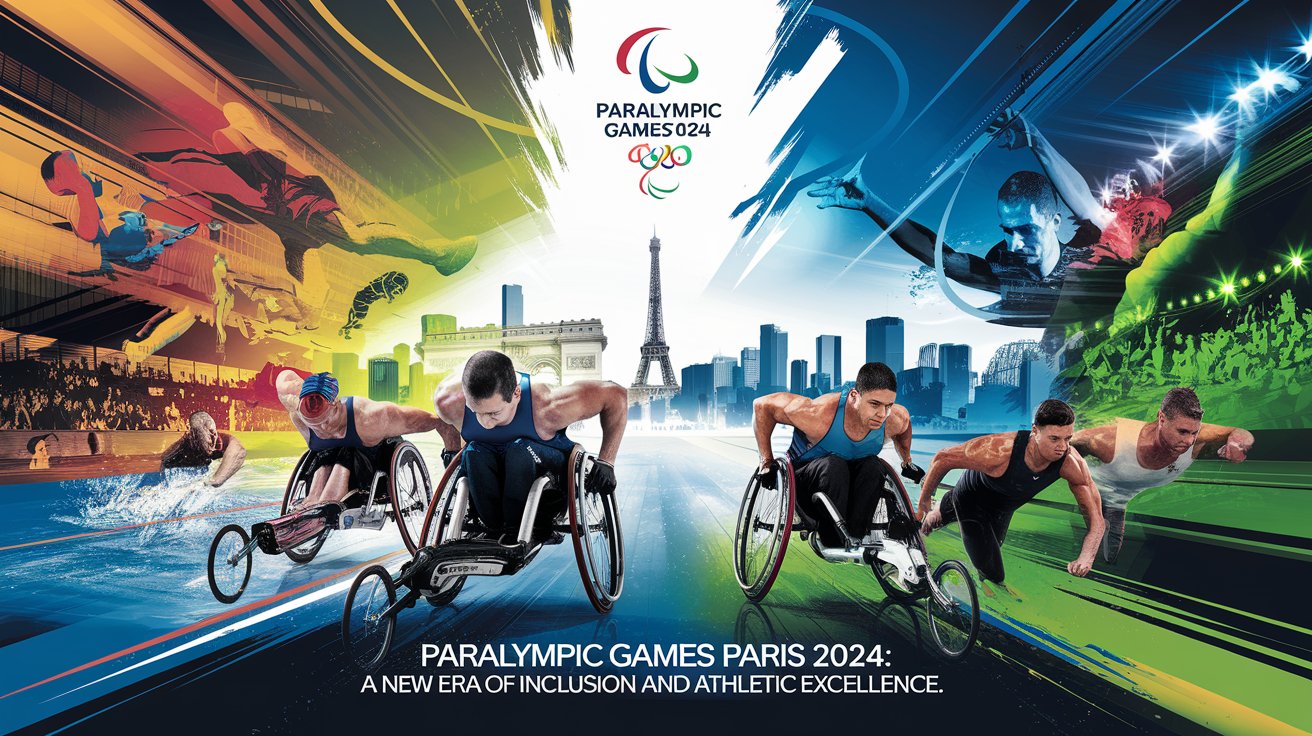The Paralympic Games, a celebration of athletic prowess, resilience, and the spirit of inclusivity, are set to return in 2024, hosted by the vibrant city of Paris, France. As one of the most anticipated global sporting events, the Paris 2024 Paralympic Games will bring together thousands of athletes from around the world to compete at the highest levels of their respective sports. These games promise not only to showcase extraordinary athletic talent but also to further the conversation on inclusivity, accessibility, and the power of sports to unite people from all walks of life. In this comprehensive blog, we will explore what to expect from the Paralympic Games in Paris 2024, including the history, the venues, the sports, and the significance of this event in the global movement for inclusivity.
A Brief History of the Paralympic Games
The Paralympic Games have a rich history that dates back to 1948, when Sir Ludwig Guttmann organized the first competition for World War II veterans with spinal cord injuries. This event, known as the Stoke Mandeville Games, was held in England and marked the beginning of what would eventually become the Paralympic movement. The first official Paralympic Games were held in Rome in 1960, featuring 400 athletes from 23 countries. Since then, the Paralympics have grown exponentially, both in terms of the number of athletes and the range of sports, becoming a global showcase for athletes with disabilities.
The Paralympic Games are held every four years, following the Olympic Games, and have been hosted by cities across the globe. These games have played a crucial role in changing perceptions of disability, breaking down barriers, and promoting the idea that sports are for everyone, regardless of physical or intellectual challenges. The Paris 2024 Paralympic Games will continue this legacy, offering a platform for athletes to demonstrate their incredible abilities and inspire millions around the world.
Paris 2024: A Landmark Event for the Paralympics
The Paris 2024 Paralympic Games will be a landmark event, as it will mark the first time the city of Paris has hosted the Paralympics. The choice of Paris as the host city is significant, given its history as a center of culture, innovation, and progress. Paris is a city that embodies diversity and inclusion, making it an ideal backdrop for the Paralympic Games. The city’s rich heritage, combined with its commitment to accessibility and sustainability, ensures that the Paris 2024 Paralympic Games will be a truly memorable and impactful event.
The Paralympic Games in Paris will run from August 28 to September 8, 2024, immediately following the conclusion of the Olympic Games. This timing allows for a seamless transition between the two events and ensures that the excitement and momentum of the Olympic Games carry over into the Paralympics. The Paris 2024 Paralympic Games will feature over 4,400 athletes from more than 180 countries, competing in a wide range of sports across various venues throughout the city.
One of the most notable aspects of the Paris 2024 Paralympic Games is the focus on inclusivity and accessibility. The organizers have committed to making the event as accessible as possible for both athletes and spectators. This includes ensuring that all venues are fully accessible, providing accommodations for athletes with various needs, and offering a range of services to support the participation of people with disabilities. The goal is to create an environment where everyone, regardless of their abilities, can fully participate in and enjoy the games.
In addition to the focus on accessibility, the Paris 2024 Paralympic Games will also emphasize sustainability and environmental responsibility. The organizers have committed to hosting a “climate-positive” event, which means that the games will not only minimize their environmental impact but will also contribute to reducing carbon emissions. This commitment to sustainability reflects the broader goals of the Paris 2024 Games, which aim to set new standards for environmentally responsible event planning.
The Venues: Paris’s Iconic Landmarks as Backdrops
One of the most exciting aspects of the Paris 2024 Paralympic Games is the use of the city’s iconic landmarks as venues for various sports. The choice of venues not only enhances the visual appeal of the games but also connects the event to the rich cultural heritage of Paris. These venues will provide stunning backdrops for the competitions, showcasing the beauty of the city while celebrating the achievements of the athletes.
One of the most prominent venues for the Paris 2024 Paralympic Games is the Stade de France, located in the suburb of Saint-Denis. This stadium, which is the largest in France, will host the opening and closing ceremonies of the Paralympic Games, as well as several athletic events. The Stade de France is known for its impressive architecture and has previously hosted major international sporting events, including the 1998 FIFA World Cup final.
Another key venue is the Champ de Mars, located in the heart of Paris, with the iconic Eiffel Tower as a backdrop. This location will host events such as archery and wheelchair rugby, offering athletes and spectators alike a truly unique and unforgettable experience. The combination of world-class sports and one of the most famous landmarks in the world will make these events among the most memorable of the games.
The Seine River will also play a significant role in the Paris 2024 Paralympic Games. The river’s banks will host several events, including paracanoe and para-rowing. The Seine’s central location and picturesque views will provide a stunning setting for these competitions, further enhancing the overall atmosphere of the games.
The Paris La Défense Arena, one of the largest indoor arenas in Europe, will host events such as wheelchair basketball and goalball. This modern, state-of-the-art facility is located in the business district of La Défense and offers excellent amenities for both athletes and spectators. Its large capacity ensures that fans will have the opportunity to witness thrilling competitions in a comfortable and accessible environment.
Other notable venues include the Château de Versailles, which will host para-equestrian events, and the Grand Palais, which will be the site of para-powerlifting. These historic locations add a touch of grandeur to the games, connecting the modern-day Paralympics to France’s rich history and cultural heritage.
Sports and Events: A Showcase of Talent and Determination
The Paris 2024 Paralympic Games will feature a wide range of sports, showcasing the incredible talent, determination, and athleticism of the participating athletes. The games will include 22 sports, with hundreds of events spread across the competition days. These sports encompass a variety of disciplines, from track and field to team sports, and from water-based events to cycling and equestrian competitions.
Athletics, one of the core sports of the Paralympic Games, will feature a wide array of events, including sprints, middle-distance and long-distance races, relays, jumping, and throwing events. These competitions will highlight the speed, strength, and agility of athletes with disabilities, as they push the boundaries of human performance.
Swimming is another major sport at the Paralympic Games, with athletes competing in a range of freestyle, backstroke, breaststroke, butterfly, and medley events. The swimming competitions are always a highlight of the games, drawing large crowds and showcasing the incredible technique and endurance of the athletes.
Team sports are also a significant part of the Paralympic Games, with sports such as wheelchair basketball, wheelchair rugby, and sitting volleyball drawing considerable attention. These sports require a combination of strength, strategy, and teamwork, and they are known for their fast-paced, intense action. Wheelchair basketball, in particular, has become one of the most popular sports at the Paralympics, with its high-energy games and competitive spirit.
Cycling is another key sport at the Paralympics, with both road and track events. Athletes compete using various types of bikes, including handcycles, tricycles, and tandem bikes. The cycling events test the endurance, speed, and tactical abilities of the athletes, and they are always a thrilling spectacle.
Other sports featured in the Paris 2024 Paralympic Games include archery, boccia, equestrian, judo, powerlifting, shooting, table tennis, and wheelchair tennis. Each of these sports has its own unique appeal and showcases different aspects of athletic ability and determination.
The inclusion of para-taekwondo and para-badminton, which were introduced in the Tokyo 2020 Paralympic Games, will continue in Paris 2024. These sports have quickly gained popularity and have been embraced by both athletes and fans. Their inclusion reflects the evolving nature of the Paralympic Games and the commitment to providing opportunities for athletes across a wide range of disciplines.
The Significance of the Paralympic Games: Beyond Sports
While the Paralympic Games are undoubtedly a celebration of athletic excellence, they also carry a deeper significance that extends beyond the realm of sports. The games play a crucial role in promoting inclusivity, breaking down barriers, and changing perceptions of disability. By showcasing the talents and achievements of athletes with disabilities, the Paralympic Games challenge stereotypes and demonstrate that people with disabilities can excel in any field, including sports.
The Paris 2024 Paralympic Games will continue this tradition, serving as a powerful platform for raising awareness about the importance of accessibility, equal opportunities, and social inclusion. The games will provide an opportunity to highlight the progress that has been made in these areas, as well as the challenges that remain. The focus on inclusivity and accessibility in the planning and execution of the Paris 2024 Paralympic Games is a testament to the organizers’ commitment to these values.
In addition to promoting inclusivity, the Paralympic Games also inspire millions of people around the world. The stories of the athletes—many of whom have overcome significant challenges to reach the highest levels of their sports—resonate with people from all walks of life. The Paralympic





